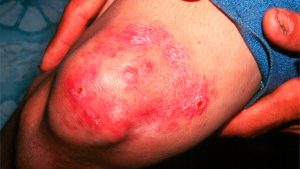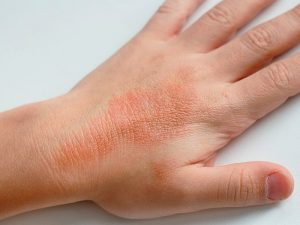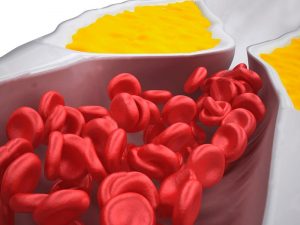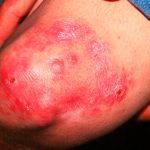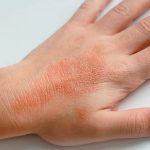What is E. coli?
You may have heard in the news about E. coli (Escherichia coli) causing people to get sick. E.coli is a large group of bacteria with several varieties. Most E. coli strains are harmless, and help
break down food, but other categories can make you extremely ill. The bacteria can be found in the environment, foods, and in human and animal intestines. Two of the more common strains of symptom-producing E. coli are referred to as Shiga toxin-producing E. coli (STEC) and enterotoxigenic E. coli (ETEC). An estimated 265,000 STEC infections occur each year in the United States, according to the Centers for Disease Control and Prevention (CDC).
What Causes E. Coli Infections?
The most common cause of E. coli infections comes from contact with animal or human feces, as this bacteria is found in stools. An infection can begin through the swallowing of tiny portions of
human or animal feces.
Common E. coli infection sites include:
• Any work that requires contact with cows, goats, or sheep.
• Consuming undercooked meat or raw vegetables.
• Drinking unpasteurized milk or contaminated water.
• Contact with feces of someone who is infected.
• Unsafe or improper food preparation (for example, neglecting to wash hands or cooking surfaces).
Symptoms
Symptoms include:
• Abdominal pains and cramps.
• Diarrhea and bloody stools.
• Discolored urine.
• Extreme fatigue.
• Loss of appetite.
• Vomiting.
Symptoms can last from five to 10 days. An E. coli infection does not normally pose a serious risk but people infected with the STEC strain can develop hemolytic uremic syndrome (HUS).
This illness is potentially life-threatening. HUS can affect the kidneys and cause symptoms such
as:
• Infrequent urination.
• Fatigue.
• Pale-looking skin.If you think you may have an E. coli infection, talk to your doctor right away. HUS can lead to kidney failure in the most serious cases. However, the CDC reports that only 5 to 10 per cent of those diagnosed with a STEC infection develop HUS. This level of infection is most common in
children under five years of age, adults 65 and older and those with weak immune systems.
When Should I See a doctor?
See a doctor if you experience any symptoms. The Cleveland Clinic recommends visiting a doctor if you are unable to keep down fluids, have bloody diarrhea or urine, or have continuous diarrhea, vomiting or lightheadedness.
E. coli Infection Treatment
In order to diagnose your infection, the doctor will test stool. Outbreaks of E. coli infection can occur in communities, so it is important not only for your health but for public health that your doctor identifies the strain of E. coli. In terms of treatment, hydration is key to preventing dehydration. Taking antibiotics is not recommended because they can increase the risk of HUS. Unless you have developed HUS, most people recover from E. coli infection naturally within a week. Diarrhea is a common symptom and, while uncomfortable, should not be treated with antidiarrheal. These medications can keep the E. coli in your system.
Prevention of E. coli Infection
Safe food practices can help to prevent E. coli infection. The Cleveland Clinic recommends the
following tips:
• Avoid undercooked foods.
• Use a thermometer when cooking meat. Meat should be cooked to at least 155 degrees Fahrenheit (68 degrees Celsius).
• Avoid cross-contamination. Clean all cooking surfaces thoroughly with soap and water before placing a different type of meat or vegetables.
• Use plastic or ceramic cutting boards for raw meats. These surfaces are easier to clean than wooden ones.
• Don’t put cooked hamburger on a plate with raw meat on it.
• Don’t defrost frozen meat on the counter.
• Keep frozen meats in individual plastic bags when thawing.
• Wash all raw produce before consumption.
• Wash your hands thoroughly before and after cooking.
Because E. coli is found in feces, always wash your hands after using the restroom or after contact with animals.
Wash Your Hands the Right Way
Washing your hands regularly and effectively is one surefire way to prevent E. coli infection, but are you doing it right? Research has shown hand dryers in public restrooms can spread germs.
The CDC recommends the following practices to properly wash your hands:
• Use warm or cold water to get your hands wet and apply soap.
• Lather well, paying attention to the back of the hands, between the fingers and under the nails.
• Wash for 20 seconds (the length of the “Happy Birthday” song).
• Rinse well under clean, running water.
• Dry your hands thoroughly using a clean towel.
Groceries and E. coli Infection
If you hop at health food stores you might be familiar with the increased use of reusable grocery
bags. Using the bags repeatedly can put you at risk of contamination. If you want to do your part
for the environment but still prevent E. coli infection, follow these recommendations from the
Cleveland Clinic:
• Wash reusable bags regularly.
• Use grocery bags only for groceries. These should carry only food items.
• Label bags. To avoid cross-contamination, designate specific bags for specific groceries (for
example, meat, vegetables).
• Don’t store your bags in the car. This applies especially in summer, as heat can help bacteria
multiply.


